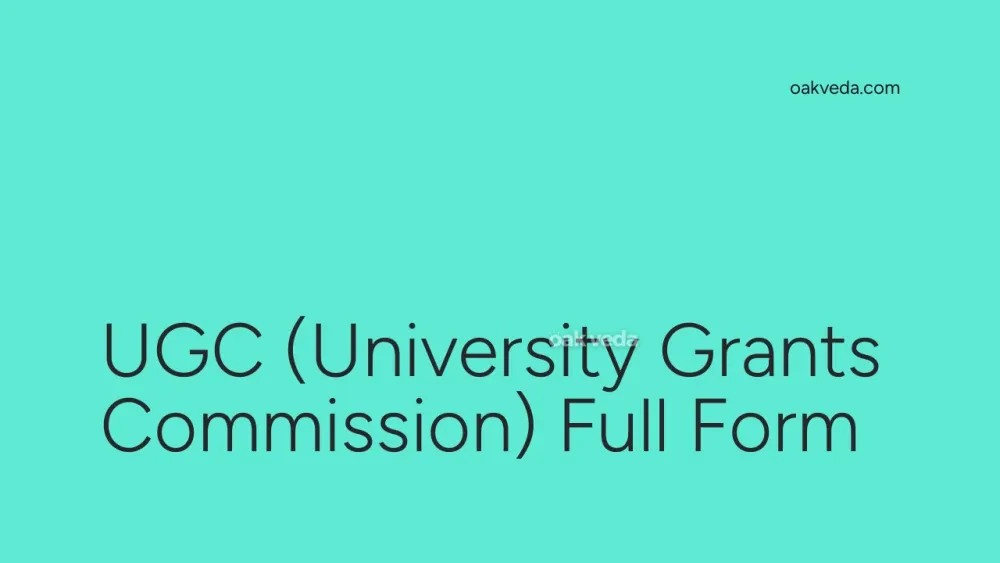
What is the Full Form of UGC?
The full form of UGC is University Grants Commission. This statutory body plays a crucial role in shaping and maintaining the standards of higher education in India.
What is University Grants Commission?
The University Grants Commission (UGC) is an autonomous organization established by the Indian government to coordinate, determine, and maintain the standards of higher education in the country. Operating under the Ministry of Education (formerly known as the Ministry of Human Resource Development), the UGC is responsible for recognizing universities, disbursing funds, and ensuring quality education across India.
Origin and Development of University Grants Commission
The journey of the UGC began long before India's independence:
- 1945: The Commission was initially set up to oversee three central universities: Delhi, Banaras, and Aligarh.
- 1947: Its responsibilities expanded to include all Indian universities.
- 1948-1949: The University Education Commission, chaired by Dr. S. Radhakrishnan, recommended changes to university education.
- 1953: On December 28, Maulana Abul Kalam Azad, the then Minister of Education, officially inaugurated the UGC.
- 1956: The UGC Act was passed, granting the Commission statutory status.
How does University Grants Commission work?
The UGC operates through a network of regional offices and its headquarters in New Delhi. It works closely with state governments, universities, and other stakeholders to implement its policies and programs. The Commission conducts regular meetings, forms committees for specific tasks, and issues guidelines to ensure the smooth functioning of higher education institutions.
Functions of University Grants Commission
The UGC plays a multifaceted role in the Indian higher education system:
- Funding: Allocates and disburses grants to universities and colleges for various purposes, including infrastructure development and research.
- Quality Assurance: Sets standards for teaching, examination, and research in universities.
- Coordination: Acts as a vital link between the central government, state governments, and higher education institutions.
- Recognition: Grants recognition to universities and determines their eligibility for central assistance.
- Policy Formulation: Advises the central and state governments on the development of higher education.
- Standardization: Conducts national-level examinations like NET (National Eligibility Test) for lectureship and junior research fellowship.
Applications of University Grants Commission
The UGC's work has far-reaching implications:
- Curriculum Development: Provides guidelines for updating and standardizing course curricula across universities.
- Research Promotion: Offers various fellowships and grants to promote research in different disciplines.
- International Collaboration: Facilitates partnerships between Indian and foreign universities for academic exchange and research.
- Distance Education: Regulates and maintains standards in distance and open learning programs.
- Skill Development: Implements schemes to enhance employability skills among students.
Features of University Grants Commission
Key characteristics of the UGC include:
- Autonomy: Functions as an independent body, free from direct government control.
- Pan-India Presence: Operates through regional offices across the country.
- Regulatory Power: Has the authority to enforce its guidelines and regulations.
- Advisory Role: Provides expert advice to the government on higher education matters.
- Inclusive Approach: Works towards making higher education accessible to all sections of society.
Benefits of University Grants Commission
The UGC's existence brings numerous advantages to the Indian education system:
- Standardization: Ensures a uniform quality of education across the country.
- Financial Support: Provides much-needed funding to universities and colleges.
- Research Advancement: Promotes cutting-edge research through various schemes and grants.
- Quality Enhancement: Regularly updates guidelines to improve the quality of teaching and learning.
- Global Competitiveness: Helps Indian institutions align with global standards of higher education.
Limitations or Challenges of University Grants Commission
Despite its significant role, the UGC faces several challenges:
- Bureaucratic Hurdles: Sometimes, red tape can slow down decision-making processes.
- Diverse Educational Landscape: Maintaining uniform standards across a vast and diverse country like India is challenging.
- Funding Constraints: Limited resources often restrict the scope of financial support.
- Adapting to Change: Keeping pace with rapidly evolving global educational trends can be difficult.
- Balancing Autonomy and Regulation: Striking the right balance between institutional autonomy and necessary regulation is an ongoing challenge.
Future Developments in University Grants Commission
The UGC is continuously evolving to meet the changing needs of higher education:
- Digital Transformation: Embracing technology for more efficient operations and better reach.
- Internationalization: Focusing on making Indian higher education more globally competitive.
- Skill-based Education: Emphasizing practical skills alongside theoretical knowledge.
- Interdisciplinary Approach: Promoting cross-disciplinary studies and research.
- Sustainable Development: Aligning educational goals with sustainable development objectives.
FAQs on UGC Full Form
-
What does UGC stand for in education? UGC stands for University Grants Commission in the context of Indian education.
-
When was UGC established? The UGC was officially inaugurated on December 28, 1953, but it gained statutory status in 1956.
-
Who controls UGC in India? The UGC is an autonomous body under the Ministry of Education, Government of India.
-
What is the main function of UGC? The main function of UGC is to coordinate, determine, and maintain standards of university education in India.
-
Can UGC close a university? While UGC cannot directly close a university, it can recommend de-recognition, which effectively stops the institution from operating as a university.
The University Grants Commission continues to play a pivotal role in shaping India's higher education landscape. As it adapts to new challenges and opportunities, the UGC remains committed to its core mission of fostering excellence in Indian universities and colleges.
You may be interested in:

